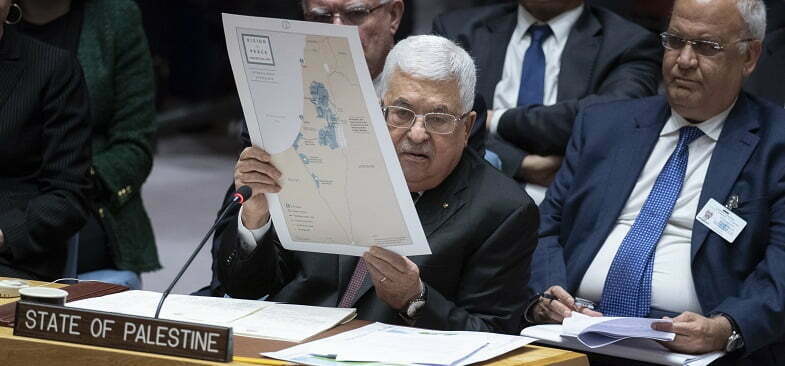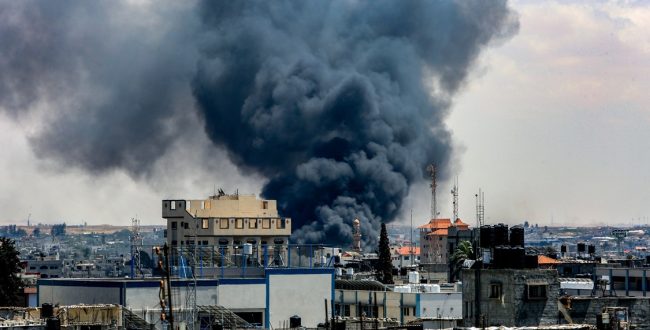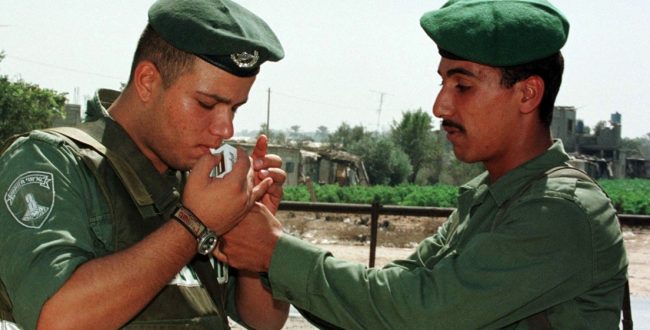On Feb. 12th, the New York Times printed an article by Sam Bahour and Bernard Avishai supporting the establishment of an Israeli-Palestinian confederation. This article is in addition to numerous other articles publish over the past months that promote confederation as the correct vision for the territory between the Jordan and the Mediterranean. This vision must be taken seriously by those who wish to end the occupation, because it is not a mere political arrangement, but a project that is being promoted by activists who have been fighting against the occupation for many years. The most serious initiative in this context is the “A Land for All” Movement. In an article by Michael Sfrad about the lessons to be learned from Oslo, he points out a very significant advantage of the confederation promoted by the movement: it not based on a separation of the kind that was prevalent among some supporters of the peace process- an ethnic disengagement based on the hatred of and fear of Arabs.
That aspect of separation prevalent among some of the leaders of the Oslo Accords and its Jewish supporters causes discomfort, and rightly so. Phrases such as “we are here, they are there”, and “a villa in the jungle”, and the fear of an Arab demographic threat, etc., cannot be the ideological foundation for people who aspire to promote equality. Even though it is best to remember that there are other approaches to the idea of the two state solution (for indeed both Hadash and the PLO supported the Oslo Accords and it is hard to accuse them of supporting Jewish supremacy), there is no doubt that the primary language that we, the Jews, use surrounding the idea of the two state solution is one of separation. The desire of those who support confederation is to contend with the conceptual, present a fitting alternative, and in doing so create new activists and new action against the occupation. This should be celebrated by all.
However, hope for change does not preclude criticism. The weak point of the confederation plan is not the agreement itself, but the interim stage until the agreement. There is no one that believes that we will arrive at an agreement in the near future, so the interim period (i.e. the continuation of the occupation) could continue many years, even decades. How does one conduct oneself politically under the rationale of confederation in a reality of occupation?
As mentioned above, critics of the two state solution claim that the discourse of separation is the problem of the Zionist left. However, it is not only they that support separation. The settlement project, which the supporters of confederation want to keep in place, also represents a purified version of separation based on hate and Jewish supremacy. The settlements are meant only for Israelis/Jews, and were founded on the limitation of Palestinian movement in the past and the future. Settlements are often established accompanied by proud statements on the part of settlers, their organizations and their representatives in Knesset, that they are the civilian spearhead of the military occupation forces. In addition, the settlements require the establishment of separate roads, separate water and electric infrastructures, and a separate justice and enforcement system which uphold a regime of separation and Israeli-Jewish supremacy.
The “A Land for All” Movement espouses freedom and national equality, but keeps the settlements in place until an agreement, which allows for, and essentially even promotes, processes the goals of which are to create separation, a lack of freedom and inequality. The claim, or hope, that a political agreement will solve the problem is weak since the current regime is inherently intended to make it impossible to establish an agreement based on equality. The fact that the movement has partners who are also settlers who wish to promote equality is neither here nor there, since the problem isn’t specific settlers, but rather the foundational political rationale of the settlement project, which will continue to exist until the coming of a future agreement that could change things at its very core.
I am not a part of the “A Land for All” Movement, primarily for the reasons cited above, but I am certainly a partner to all those who fight against military control of a civilian population. I am not happy with the prospect of evacuating settlers from their homes. But the question of the place of settlers in the fight against the occupation is no less disturbing. Can a person who lives within a political project the goal of which is disinheritance, theft and the oppression of the Palestinians under the occupation, fight that same mechanism?
I would like to share a few thoughts: not regarding the agreement after the occupation, which, as mentioned, is not the heart of the issue in my opinion, but rather regarding necessary action all the while the occupation continues. These thoughts are mostly directed towards settlers who are members of the “A Land for All” Movement as well as others who are partners in the fight against the occupation, out of a desire to, together, fight against Israel’s military rule over the territories.
In my opinion, so long as the IDF administrates the separation in the territories in the name of the State and those working on its behalf, those settlers who strive for national equality, in moral terms, cannot focus on humanitarian aid to the Palestinians, or dialogue regarding future equality, but must act with the Palestinians against the rule of separation, supremacy, theft and disinheritance.
First, any settler who wants to fight against the occupation, whether they are a member of “A Land for All” or not, should ask themselves why they do not move within the borders of the green line until an agreement, just as every soldier who opposes the occupation must ask themselves honestly if their actions contribute to the fight against the occupation or counteract it. Even if in the future, within the structure of a sovereign Palestine, settlements become morally legitimates, moving within the borders of the green line so long as the occupation continues is the only decent thing to do. I have a hard time imagining any serious fight undertaken by a Jew against the rationale of separation while that very same Jew lives in a settlement founded on that rationale. The vision of living in the territories after the end of the occupation requires a return to the borders of the green line so long as the occupation continues.
Second, those settlers who support national equality should fight against any destruction of Palestinian homes or villages in Area C. The voice of settlers should also be heard when Palestinians are disinherited from their lands (and not only against the immorality of evacuating Jews from their homes) especially if they are private lands. These processes have never stopped and over the last few years have even increased. I do not refer to the fight against the hilltop youth, as fitting as it is, but the JNF, the civilian administration, the local councils, etc.
Third, the settlements should be challenged from within. Many towns in the territories have pools, host family activities and more. In many cases, the road access is via roads for Jews only. Jews, and tourists are allowed to enter the settlement area, but not Palestinians. This policy imposes the rule of the only authority in the territories- the State of Israel. The ability of left-wing activists against the occupation to talk to the heart of settlers is limited, but settlers who support equality and oppose the occupation have more access to their communities. They can challenge the inequality from within: demand that Palestinians be allowed in to the towns, the pools, the attractions, and school campuses; demand that the purely Jewish area become accessible to Palestinians. The establishment of fields outside the settlements in which Jewish-Arab dialogue occurs is one thing, but a true challenge to separation can only come from inside.
Fourth, settlers who strive for equality must join political battles led by Palestinians. Because, according to “A Land for All’s” vision, settlers will remain in the State of Palestine which will be administered by Palestinians, preparing people for the fight against Jewish supremacy could begin even now. There are some local committees in Palestinian villages fighting for their land and against separation. The settlers, who are the power in the territory, could harness their strength on behalf of the weak- fight for the opening of Shuhadah Street in Hebron, against the building of access roads for Jews in the West Bank, against the completion of the separation fence, for giving shepherds in the Hebron hills and the Jordan Valley access to their lands, against turning springs into pleasure spots only for settlers , and of course, against the establishment of new outposts and settlements that are inherently an annexation and the absorption of land. They can lead the fight for the transfer of IDF training areas to the Negev and for transparency in the civilian administration, sue against the spread of “Mekorot” pipelines and electrical infrastructure in Area C, and against the legalization of illegal outposts All of these fights are not done in the name of separation and will not bring about the evacuation of settlers from the land of their fathers. Rather they are fights against separation and for equality. Settlers who strive for equality, especially those who are members of the “A Land for All” Movement or who are philosophically close to it, cannot stand aside.
Everything mentioned above leads to my fifth point. I do not rejoice over the prospect of evacuating settlers from their homes, I am only requesting that so long as there is an occupation we fight against the rationale of supremacy and separation that the settlements project promotes. So long as the goal of the settlements project is separation I will not buy wine from Psagot, mushrooms from Tekoa, olive oil from Shiloh and dates from the Jordan Valley. I will not take my children on trips to the trail of the forefathers or the beautiful springs in the territories that the Palestinians have been excluded from with violence. I will do so, not because I hate settlers, God forbid, or am happy at their evacuation or want to punish them, but because I am against separation. Are there settlers who are willing to join this call even at the price of the strength of their home (which is just the might of supremacy)?
The discourse on the left regarding the most effective solution to the conflict remains mostly in the intellectual sphere. It should be assumed that when the solution arrives it will be worded in a less organized fashion than the Geneva Accords or the vision of “A Land for All” because a major player in the fight, the Palestinian nation in the West Bank and Gaza, will administer it in a way that we cannot currently imagine. It’s possible that the Palestinians will agree to leave blocks of settlements, it’s possible that they will be happy to turn Beit El Palestinian, and its possible that their demands will be entirely different. It is difficult to believe that they will agree to leave all the settlements, since some of them were intentionally built to prevent the development of the Palestinian nation and its state. However, it is also hard to envision how the Israelis will respond to the removal of the IDF’s authority over the Jews that live over the border, or to the evacuation of a settlement like Ariel. Not all scenarios can be envisioned.


















